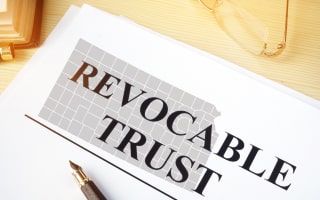How to Find Owners of Properties
in Kansas

Doing a property owner search in Kansas is simple and easy to do. The Kansas Open Records Act lets you access public records, including property-related documents. These records are open to everyone. You don't need to explain why you're asking for them. The government offices keep these records, and you can request them without a fee.
If you're curious how to find the owner of the property by address, you can also use online services or check with local agencies to get the details you need.
Here are the different ways to find the owner of a property in Kansas:
Visit Your County's Registry of Deeds
A Registry of Deeds is where you can find records about real estate transactions, like who owns the property, any mortgages, or if there are any liens. You can check these records when buying a home in Kansas to ensure everything is clear.
In Kansas, each county has an office that holds these records. To find the property owner by address, you'll need some basic information like the property's address or a legal description (if you have it).
Many Kansas counties also offer online searches. For example:
- Sedgwick County Register of Deeds
- Johnson County Register of Deeds
- Shawnee County Register of Deeds
- Douglas County Register of Deeds
- Wyandotte County Register of Deeds
Check the Land Records Website
Local Register of Deeds offices in Kansas counties create land records by recording documents such as deeds, mortgages, and liens. These offices check each document to ensure it meets state laws before accepting it. Once approved, they organize the documents in index books by the seller's and buyer's names and the property's legal description.
You can find the owner of a property free in Kansas through the Kansas Register of Deeds Association's website, which links to local county offices.
How To Search the Website
To search land records on the Kansas Register of Deeds Association's website, gather the following:
- The property's address
- The property's legal description
Visit the Kansas Register of Deeds Association's website for county office links for detailed property ownership records and related documents.
Go to the City or Town Assessor's Office
In Kansas, the city or town assessor's office handles property records. This office tracks who owns properties, their assessed values, and tax details. It also ensures property taxes are calculated fairly by reviewing property assessments.
You can visit your local assessor's office if you're doing a Kansas house owner lookup. Here's what you should do:
- Visit in Person: Visit the assessor's office in your city during business hours. Some offices might need an appointment, so check before going.
- Bring Information: Have the property address ready to help with the search.
- Request Records: You might have to fill out a form and pay a small fee for copies.
Kansas House Owner Lookup
Here are links to some Kansas county offices where you can search for property details:
- Sedgwick County Appraiser
- Johnson County Appraiser
- Shawnee County Appraiser
- Douglas County Appraiser
- Wyandotte County Appraiser
For a full list of assessor's offices in Kansas, visit the Kansas County Appraisers Association's website.
Review Tax Records
Property tax records are important documents at your local assessor's office in Kansas. These records hold key information, including the following:
- Current Ownership: This shows who owns the property right now.
- Assessed Values: This indicates how much the property is worth for tax purposes.
- Tax History: This details past property tax payments, including how much you owe and when you paid.
If you need to get a property tax record in Kansas, here's what you should do:
- Visit the Local Assessor's Office: Head over to your county or city assessor's office during business hours. It's a good idea to call ahead to see if you need an appointment.
- Bring Necessary Information: Include details like the property address to help with your search.
- Request Copies: You might need to fill out a form and pay a small fee to get copies of the records.
Many counties in Kansas let you access property tax records online. For more information about property tax records across Kansas, visit the Kansas Register of Deeds Association's website.
Hire a Title Company or Agency
Kansas title companies help you with real estate deals by ensuring property titles are free of liens or other issues. They do this by running thorough title searches. These searches search public records to verify who owns the property and find any problems that might affect the sale.
Title companies also offer title insurance, which protects buyers and lenders from losing money if there are problems with the title. These businesses have access to a variety of property records. They can provide comprehensive searches containing ownership history, liens, mortgages, and any legal claims on the property.
In Kansas, a title search usually costs between $125 and $250, depending on how complicated the search is.
![]() Turn to a Commercial Service Provider
Turn to a Commercial Service Provider
Commercial service providers like PropertyChecker.com offer useful information about property ownership. PropertyChecker.com lets you search statewide to find current and past owners of properties. It can also help you identify the people behind companies or trusts, giving you a clearer picture of who owns what.
If you want to look up information on PropertyChecker.com, here are the steps:
- Visit the Site: Go to PropertyChecker.com.
- Enter Property Info: Writing the property's address in full will help you get more accurate results.
- Check Ownership Details: After you search, you'll see information about current and previous owners, including any companies or trusts linked to the property.
- Look at Extra Info: You might also find property tax records, purchase history, and any liens on the property.
Other Ways to Get Property Information
These are other methods to find out the owners of a property:
- Talk to Neighbors: They can give you information on current or past owners.
- Talk to Local Agents: These professionals often have access to property records and can help you find ownership information.
- Get Real Estate Lawyers: Lawyers can do searches and give you legal advice about property ownership.
What Are the Different Types of Property Ownership in Kansas?

Property ownership means you have the legal rights to own a property. These include rights from you, your spouse, or even unrelated people. How you set up property ownership can affect how you transfer and pay taxes on the property.
The ownership setup can also influence your risk, liability, access to loans, how probate works, and tax responsibilities. Choosing the right type of property ownership can safeguard your assets and expand your finances.
Common Types of Property Ownership in Kansas
Many categories of property ownership are available in Kansas, with each one having its own benefits and downsides. Here are the most common:
| Ownership Type | Benefits | Downsides |
|---|---|---|
| Sole Ownership | Complete and sole rights over the property; easy transfer upon death | Property may go through probate unless there's a will. |
| Joint Tenancy | Automatic transfer of property to the other owner upon death. | Both owners must agree on transactions. Debts of one owner can affect the other. |
| Tenancy in Common | Ability to own different shares of property; shares can be sold. | No right of survivorship; the deceased owner's share follows their will or state laws, complicating matters. |
| Trust Ownership | Potential tax benefits; avoids probate; keeps ownership details private. | Setting up and managing a trust can be complex and may involve ongoing costs. |
Kansas does not recognize tenancy by entirety as a separate type of property ownership. Instead, the spouse's own property is classified as either joint tenancy or tenancy in common, unless stated differently.
Finding the Owner of a Trust or Corporation That Own Properties in Kansas

In Kansas, property ownership isn't just for individuals. Trusts, corporations, partnerships, and LLCs can own property. With these entities, figuring out who owns property can be trickier than knowing the owner of a single-family home.
If you need to identify the owner of a property, it can take several steps. It might help to get professional assistance. Lawyers or third-party title search companies can make the process easier and provide useful insights.
If you want to track down the owner of these entities on your own, you can follow these steps:
Finding the Owner of a Trust in Kansas
- Check Public Records: Go to the county Register of Deeds office. Search records with the trust as the owner. Documents may also mention the trustee.
- Review Trust Documents: If you can access it, check the trust document itself. This document might list beneficiaries and trustees. You may need to contact the trustee directly if you have their contact information.
- Consult Legal Resources: Use legal databases or talk to a lawyer to help you understand the documents and records.
Finding the Owner of an LLC in Kansas
- Search the Secretary of State's Business Database: Go to the Kansas Secretary of State's website and look for the business entity search tool. Search using the LLC's name as a keyword.
- Review Public Filings: Look for any public filings from the LLC. These can sometimes reveal information on owners.
- Check Local Business Directories: Reach out to business directories to gather details about nearby companies and their owners. You can also connect with local chambers of commerce for assistance.
Finding the Owner of a Corporation in Kansas
- Get Information via the Secretary of State: Head to the Kansas Secretary of State's website. Use the business search tool to check the corporation's officers and agents.
- Examine Annual Reports and Filings: Corporations need to submit yearly reports that name officers and shareholders. These documents can give you insights into ownership.
- Utilize Business Research Tools: Use external databases to access in-depth corporate data, such as financials and ownership details.
Common Methods of Property Transfer in Kansas

Property deeds serve as essential documents that allow one party to pass real estate ownership to another. The deed explains what rights are being transferred and acts as proof of ownership. In Kansas, several methods guide how to transfer property, mainly through different deeds.
Types of Deeds in Kansas
-
Grant Deeds: These deeds transfer ownership from the seller to the buyer. They usually come with guarantees that the property is free from any issues except those already revealed. This gives buyers some confidence in their purchase.
-
Quitclaim Deeds: Quitclaim deeds transfer the seller's share of the property with no promises attached. People often use this method in cases like family transfers or divorce agreements, where the parties are familiar with one another.
-
Warranty Deeds: Warranty deeds give the buyer the highest level of security. They confirm that the seller owns the property fully and has the authority to sell it, shielding the buyer from any potential disputes later on.
Less common types of deeds include:
- Mortgage Deed
- Bargain and Sale Deed
- Deed of Trust
Step-by-Step Guide to Property Transfer in Kansas

Knowing how to transfer property correctly is important. Here's how you can do it in Kansas:
- Choose the Right Type of Deed: Decide which deed works best for you.
- Title Search: Check to see if there are any liens or issues on the property. You can do this by looking at public records at your local Register of Deeds office.
- Prepare the Deed: Write up the deed according to Kansas law. Confirm it has all the necessary details, including legal descriptions and signatures. You can use legal templates for help.
- Pay Transfer Taxes: Kansas does not impose a state transfer tax. However, counties may charge their own fees related to property transfers.
- Record the Deed: Take your completed deed to the local Register of Deeds office to record it. This step makes the transfer official and public.
- Review and Confirm: After you submit the deed, review any papers from the Register of Deeds confirming your deed has been recorded.
- Get a Copy of the Recorded Deed: Ask for a copy of the recorded deed for your records. This copy proves your ownership.
- Update Records: Make sure to update the local tax office with the new owner's information so that the property taxes are billed correctly.
- Get Title Insurance: Consider obtaining a title insurance policy to secure additional coverage against potential claims related to your property ownership.
Kansas Homeowner Lookup
- Owner(s)
- Deed Records
- Loans & Liens
- Values
- Taxes
- Building Permits
- Purchase History
- Property Details
- And More!